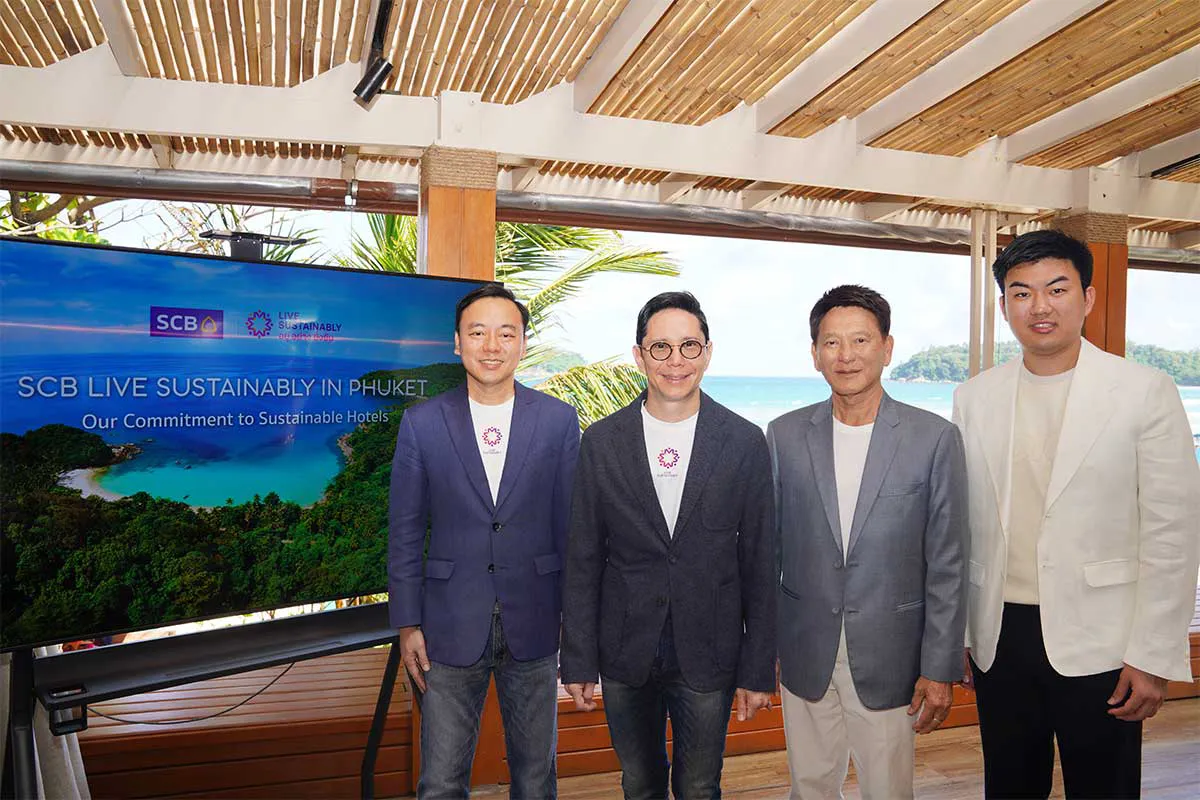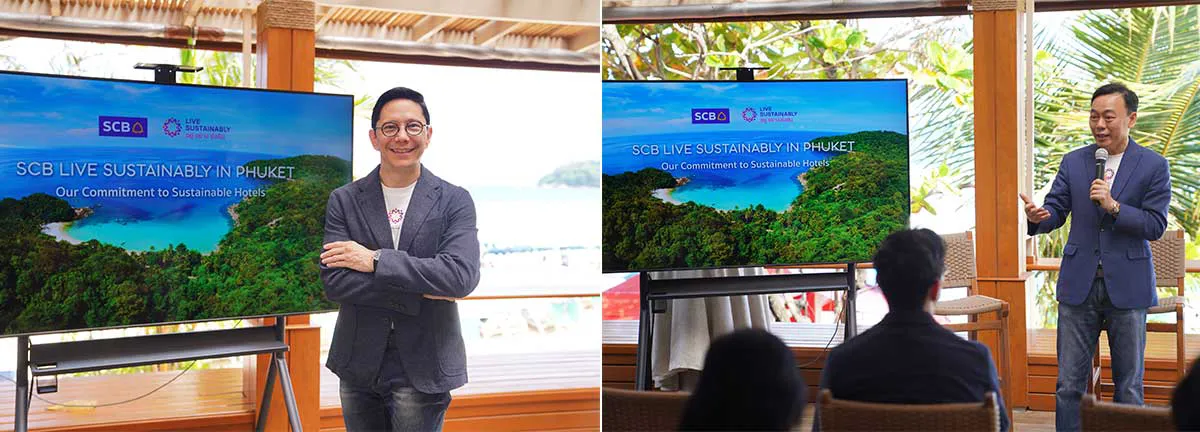I WANT
RELATED LINKS
I WANT
RELATED LINKS
RELATES LINKS
I WANT
RELATES LINKS
Services
Related Links
Use and Management of Cookies
We use cookies and other similar technologies on our website to enhance your browsing experience. For more information, please visit our Cookies Notice.
SCB Champions Sustainable Tourism, Drives Phuket Hotel Transition Toward Global Sustainability Standards
• Supports two prominent players, “Kata Group” and “Jee Teng Hospitality,” in leading Phuket’s shift to sustainable hospitality and winning over global tourists
Siam Commercial Bank (SCB) remains confident in the potential of Thailand’s tourism industry as a global destination and is committed to being a sustainability partner in transforming the hotel sector. SCB is piloting efforts in Phuket to help hotels adopt environmentally friendly practices, achieve both international and local sustainability certifications, and access sustainable financing. This initiative supports the upcoming Global Sustainable Tourism Conference in 2026 and the broader goal of positioning Phuket as a sustainable tourism hub by 2027. “Kata Group” and “Jee Teng Hospitality” are highlighted as leading case studies, actively advancing sustainability through energy conservation, greenhouse gas reduction, community engagement, and driving long-term income for southern Thailand’s tourism sector.

SCB Positions Itself as a Leader in Supporting Sustainable Tourism in the Hotel and Service Sector
Mr. Kris Chantanotoke, Chief Executive Officer of Siam Commercial Bank, emphasized the vital role of tourism in Thailand’s economy. In 2024, the sector generated over 2.6 trillion baht, accounting for approximately 14% of the country’s GDP. Phuket alone contributed more than 490 billion baht, the highest among all provinces. Despite a nationwide decline in foreign tourist arrivals due to various factors, Phuket continues to show growth potential. In the first five months of 2025, the province welcomed over 2.4 million foreign tourists, up 8% YoY, in contrast to the national decline of -3% YoY to 14.4 million visitors. Phuket is also attracting more European, American, and Middle Eastern travelers, high-spending and long-staying segments, which positively impacts its hospitality and tourism sectors. SCB has long prioritized the hotel and service sector, holding the largest loan portfolio of 135 billion baht in this segment among Thai banks, of which the Andaman region accounts for 25%. In Phuket alone, SCB’s hotel loan portfolio stands at approximately 20 billion baht.
Mr. Kris emphasized that the hotel sector plays a crucial role in achieving sustainability goals, as it is a segment capable of driving tangible environmental change. Notably, 11% of global greenhouse gas emissions originate from the tourism industry, including the hotel business. Meanwhile, the trend toward sustainable tourism continues to gain momentum, becoming a key consideration for travelers worldwide. This is underscored by Booking.com's 2025 Sustainable Travel Report, which surveyed over 32,000 travelers across 32 countries and revealed that more than half (53%) are concerned about sustainability, particularly its impact on local communities and the environment. As Thai hotels adopt more sustainable practices, they stand to benefit from attracting environmentally conscious tourists who are willing to spend more. At the same time, this shift can help stabilize hotel revenues by reducing dependency on specific tourist groups and moving from a focus on "quantity" to "quality" tourism. This approach also enhances the uniqueness and identity of Thai tourism.
Recognizing this potential, SCB is committed to supporting this transition alongside entrepreneurs in the sector. In Phuket, which serves as a pilot province for sustainable development, local hotel operators are showing strong enthusiasm in advancing sustainability. With the goal of becoming a sustainable tourism hub by 2027 and in preparation for hosting the Global Sustainable Tourism Conference in 2026, many hotels in Phuket are actively transforming their operations to meet international sustainable labels.

SCB is committed to being a long-term partner in the journey toward sustainability under the philosophy “SCB Live Sustainably,” with a focus on supporting the hotel industry and businesses related to Thai tourism. The Bank has outlined two key operational strategies:
- Supporting Existing Hotels Beginning Their Transition (Less Brown): SCB collaborates with sustainability experts to help hotel businesses build awareness, understanding, and develop tailored sustainability strategies. The Bank also provides transition financing to support improvements in energy efficiency, water management, and the adoption of renewable energy. These efforts aim to reduce operating costs while laying the groundwork for long-term sustainable operations.
- Supporting Sustainable Hotels: For businesses seeking to achieve international sustainability benchmarks, SCB offers financial products linked to clear, measurable sustainability targets, including Sustainability-Linked Loans, Green Loans, and Green Bonds. These financing solutions support efforts to (1) Obtain Sustainable Building Certifications for new construction or renovation projects, in line with global standards such as LEED (Gold and Platinum), EDGE, WELL, or TREES; and (2) Achieve Sustainable Operating Certifications, including GSTC-recognized certifications such as Green Hotel Plus, EarthCheck, and Green Globe, among others. SCB is driving the transition of its hotel and service sector loan portfolio in Phuket toward sustainability, using the province as a pilot model for broader national adoption.
Beyond financing, SCB is dedicated to providing end-to-end partnership support, working closely with clients to understand their business needs and leveraging its network of public and private sector partners to deliver expertise, technology, and knowledge throughout the transformation process. Long-standing SCB clients such as Kata Group and Jee Teng Hospitality, two prominent hotel groups in Phuket, exemplify this transformation. With SCB’s support, both have advanced their operations into sustainable hotel models, showcasing environmentally responsible practices that inspire other hotel operators to follow the path toward sustainability.

Kata Group Commits to Environmental Advocacy and Community Well-being, Plans Major Investment to Transform Nine Hotels into Sustainable Properties
Mr. Pramookpisitt Achariyachai, Chairman of Kata Group Resorts Thailand and Beyond Hotels & Resorts, revealed that Kata Group operates nine hotels across four southern provinces—Phuket, Phang Nga, Krabi, and Samui—with a total of 2,200 rooms, the largest hotel network along Thailand’s Andaman coast. With over four decades of experience in the hospitality industry, the group has witnessed a clear shift in traveler behavior, as sustainability increasingly becomes a key factor in tourists’ decision-making, from choosing destinations to accommodations and activities. In response, Kata Group is allocating significant investment to transform its hotels into sustainable properties. This includes plans to bring in internationally recognized hotel brands that adhere to high sustainability standards to manage its properties.
Guided by Beyond’s philosophy, “Beyond A Good Place Is A Better Planet,” the group integrates environmental and social responsibility into every aspect of the guest experience, creating holidays that are not only enjoyable but also mindful of nature. Kata Group is committed to reducing the use of natural resources, implementing energy-saving technologies, and cutting carbon emissions. The Group also embraces the ESG framework, with a particular emphasis on Governance, incorporating sustainable procurement practices, fostering community engagement, and promoting environmental awareness. Guests are encouraged to participate in eco-friendly activities, and employees receive regular training to contribute meaningfully to sustainability initiatives. These efforts have resulted in all Kata Group hotels earning numerous domestic and international sustainability certifications, reinforcing the group’s leadership in sustainable tourism in Thailand.
Jee Teng Hospitality Pioneers Green Hospitality with Sheraton Phuket Naiharn Resort & Spa
Mr. Saharat Jivavisitnont, Executive Director of Jee Teng Hospitality, stated that the company currently manages two hotels in Phuket: Four Points by Sheraton Phuket Patong Beach Resort and the under-construction Sheraton Phuket Naiharn Resort & Spa. Both properties are designed as green hotels throughout the entire development and operational process, supported by green loans from Siam Commercial Bank.
From the outset of its expansion into the hotel sector, Jee Teng Hospitality has prioritized sustainable business practices. By partnering with Marriott International, the company brings world-class management standards to the Sheraton Nai Harn Beach project, ensuring it delivers a high-quality, environmentally conscious guest experience for travelers from around the globe.
“We recognize the shift in global regulations and the rising expectations of a new generation of eco-conscious travelers,” said Mr. Saharat. “Jee Teng Hospitality is committed to elevating our sustainability standards to align with international benchmarks, while also pursuing domestic sustainability certifications.” This commitment is already evident at Four Points by Sheraton Phuket Patong Beach Resort, which recently earned the Green Leaf Certificate. Meanwhile, the Sheraton Nai Harn Beach Resort & Spa is being comprehensively developed to meet the EDGE green building certification, demonstrating the company’s dedication to environmental responsibility and sustainable growth.
